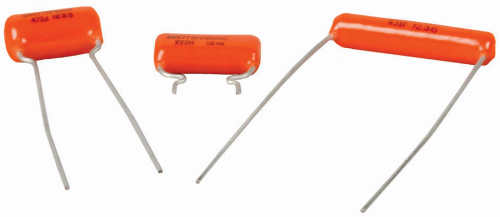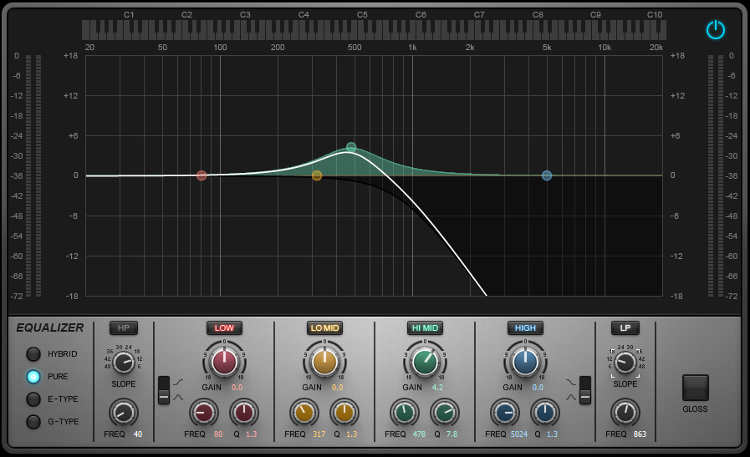Don’t believe everything you read on the internet, especially when it comes to guitar tone
Tone control capacitors should be a pretty straightforward topic. But spend some time on the internet, and you might surprised at the feats of glory—and perfidy—involved with the humble capacitor. So, let’s take a look at some facts, as well as some fiction.
TONE CONTROL CAPACITORS REDUCE HIGH FREQUENCIES
Yes, this is true, but it’s not the whole story. Rolling back the tone control all the way forms a resonant circuit with the pickup, and this creates a midrange boost. The image at the top uses an equalizer to emulate the response of a tone control rolled all the way back; note that it’s necessary to add a resonant peak – not just remove highs.
The volume control, cable, and amp can damp this peak somewhat; but feeding a high-impedance input, like an audio interface’s high-impedance “guitar” input, buffer board, some signal processors, and the like, retains this peak.
ALL CAPACITORS WITH THE SAME VALUE ARE THE SAME
Capacitance can vary with frequency, temperature, and applied voltage; some ceramic capacitors are even somewhat microphonic. If your guitar uses a ceramic capacitor for its tone control and you think your guitar sounds different under stage lights then when you’re offstage, you’re probably right. And note that not all ceramic capacitors are the same—there are two different ceramic capacitor classes. The value can be consistent within 1% for expensive types, or vary from +80/-20% for cheapo components (as often found in knock-off guitars).
DIFFERENT CAPACITOR TYPES DON’T AFFECT TONE BECAUSE THEY’RE NOT IN THE OUTPUT SIGNAL PATH
This assumes that tone control caps only roll off high frequencies, but we’ve already shown, that’s not the case. The resonant peak created by the capacitor definitely affects tone, and if the capacitor value is inconsistent, that peak can have a different frequency.
REPLACING A HIGH-QUALITY MODERN CAPACITOR WITH A “VINTAGE” CAPACITOR CAN HAVE A PROFOUND EFFECT ON TONE
This may be true, but it’s probably because the values are slightly different, not because the capacitor types themselves are different. Slightly different values will create a different resonant frequency when paired with your pickup.

PEOPLE LIKE ORANGE DROP CAPACITORS BECAUSE OF THE PLACEBO EFFECT
Actually, there’s a valid reason why Orange Drop capacitors are considered to be excellent choices for guitars. Sprague was a leading name in capacitors, and in the mid-20th century produced capacitors for industry, the military, and aerospace. The Orange Drop capacitor line introduced in the 60s introduced capacitors of the modern era—more stability, higher resistance to temperature variation, low moisture absorption, no microphonics, and other desirable attributes. (The technology can also handle high voltages, making them well-suited to tube amps.)
Cornell Dubilier (CDE), another high-quality capacitor manufacturer, acquired the Orange Drop line from Sprague in late 2012, and they’re still readily available.
